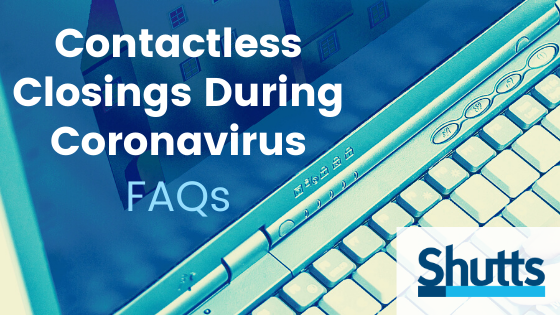
Commentary by: Michael A. Sjuggerud
The current coronavirus era is seeing e-signings, drive-by closings, virtual appraisals and other measures being taken to help real estate transactions move forward. The following commentary will address answers to some of the most frequently asked questions about contactless closings amid COVID-19.
- What is a “contactless closing”?
A contactless closing occurs where the buyer, seller, and closing attorney/title agent do not meet in person to conduct the signing ceremony, but rather the signing ceremony occurs through electronic means. Prior to the pandemic, measures to facilitate contactless closings were established, including technological advances and changes in the laws of many states. The real estate industry has been slow to fully adopt these measures, but the pandemic has served as a catalyst for the industry to embrace them. Examples of such measures include virtual tours (where the buyer views the property online rather than physically entering the property), e-signings (where documents are electronically signed instead of signed in person), virtual inspections (where an inspector views a property remotely while a real estate agent transmits video of the property to the inspector), drive-by signings (where a party such as a buyer drives to the offices of a closing attorney/title agent but never leaves their car while executing closing documents), and online notarizations (where a notary public is physically remote from the person executing a legal instrument such as a deed but confirms the identity of such person and electronically notarizes their signature).
- How has COVID-19 affected the real estate transaction process and the buyer/investor experience?
Buyers/investors who desire to purchase a property during the coronavirus pandemic will have mixed experiences. With respect to a contactless closing involving the cash purchase of a property (residential or commercial) with no outstanding mortgages or liens, buyers/investors could experience a smooth process, assuming the closing attorney/title agent has systems in place to support contactless closings and the transaction falls within the title insurer’s guidelines. In contrast, a contactless closing involving a buyer/investor who seeks to finance the purchase of a residence which has outstanding mortgages or liens may experience delays or frustrations due to the number of stakeholders involved. Most title insurers do not currently permit fully contactless closings (i.e., remote online notarization) for the purchase of commercial property with purchase money mortgages due to the risk profile of such transactions. Accordingly, the parties who desire to conduct fully contactless closings for commercial closings involving purchase money mortgages should first consult with the closing attorney/title agent to confirm the title insurer’s requirements.
- What risks to buyers/investors are there to utilizing contactless services and processes?
There are several risks and uncertainties that may accompany contactless processes, such as not being able to thoroughly tour a property. Among all of the contactless services, relying on a virtual tour as the sole inspection method presents the greatest risk to the buyer/investor. Without a physical inspection, the buyer/investor cannot determine as easily whether there are any obvious defects (e.g., structural issues or mechanical operation of systems) or any evidence of seller’s concealment of defects (e.g., painting over water intrusion or mold).
- What are the potential perks of buying a residential property amid the pandemic?
“Stay at home” orders have caused a general decline in economic activity. As result, sellers, lenders, agents, and closing attorneys/title agents want to close deals to keep their businesses going. While the current environment does not mean that buyers/investors can exact price concessions from sellers in the absence of a distressed sale, it should mean that everyone involved in the process has an incentive to cooperate and close the transaction in a timely manner.
- What, if any, impact have “contactless/hands-off” closings had on helping to keep the real estate industry going?
Contactless closings are simply process oriented; they do not drive the economics of real estate deals. The economics are largely being driven by states’ differing “stay at home” orders, which have disrupted the employment of millions of Americans. States with less restrictive orders that choose to reopen sooner will likely experience a quicker rebound in employment and commensurate transaction volume. On the other hand, states with more restrictive orders that choose to delay reopening will further stymie employment and transaction volume.
- Final takeaways?
It is imperative for buyers/investors to take a proactive role throughout the entire purchase and closing process. While “stay at home” orders are in effect, many people are working from home who would otherwise work in an office. Details may be overlooked, deadlines ignored, or mistakes may be made in documentation. Buyers/investors should plan on “Murphy’s law”. This means that buyers/investors should read every document, address any errors, routinely monitor and reply to emails, be in frequent contact with closing attorneys/title agents, and keep everyone on schedule. Buyers/investors should not assume that realtors, lenders, appraisers, inspectors, contractors, closing attorneys/title agents will get everything right and on schedule.
